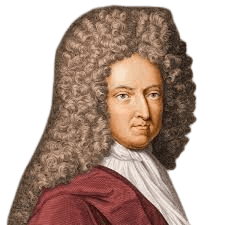Life and achievements
Early life
Daniel Defoe was born in 1660 in London to a Flemish father, James Foe, a tallow chandler. His father was a Nonconformist, which affected Defoe's religious and educational views and choices. He was enrolled at Charles Morton's Academy at Newington Green, an advanced and liberal learning institution. This experience gave Defoe a general and efficient education, meaning he learned subjects that were only sometimes taught in universities.
It was for the Presbyterian ministry that Defoe planned, but he did not pursue it and went into trade instead. He was born in a time of history, which included the Great Plague of London in 1665 and the Great Fire of London in 1666, which he would have experienced. These events would later be well articulated in his writings as he could describe the experiences of the individual and the community.
Unfortunately, Defoe's father's wish for him to have a successful career in commerce was not easy to achieve. He participated in different commercial activities, such as importing merchandise and investing in new technologies. However, the man's propensity towards speculation and the general economic crisis of the period resulted in his financial problems, which reached their apex in 1692 with bankruptcy. These experiences, though difficult, gave Defoe a first-hand experience of economic and social issues, which became central themes in his later works.
In 1684, Defoe married Mary Tuffley, the daughter of a merchant. The marriage gave him a large dowry, which helped him solve his financial problems for some time. They had eight children, of whom six reached the age of majority. Despite his rather messy financial situation, Defoe continued learning and writing, thus preparing the ground for further literary activity.
Legacy
Daniel Defoe's contribution to literature is immense and diverse. He is considered one of the pioneers of the English novel, and "Robinson Crusoe" is one of his most famous works, which inspired many authors and literary trends. The novel's survival, creativity, and determination themes are still relevant today and are enjoyed by people worldwide. Defoe's talent for creating believable and exciting plots paved the way for the development of the novel, incorporating elements of the adventure genre with complex examinations of the human mind and society.
The above analysis shows that Defoe did not only write fiction. His journalistic works include "The Review", which he edited for nine years, providing a basis for modern periodicals. He used political pamphlets and essays to express his ideas about economic and social problems, called for change, and shifted the people's perceptions. Many of Defoe's trade, commerce, and political works were relatively progressive. They contained ideas that would not be typical for the given period and would later be considered the basis of economic theories.
He also similarly used characters and their transformations. It is a common feature of Defoe's works that the main characters are only sometimes noble and unambiguous, which is typical of the realistic approach to depicting the human essence. Such an approach to characterization was unique, and many authors followed it. Thus, Defoe's works can be considered models for further developing the analysis of the human character and the relations in society.
Nevertheless, the problems with finances and the law that haunted the last years of Defoe's life did not diminish the respect and recognition of his work. This made him continue producing works in a position to meet his time's changing political and social environment. Defoe is considered one of the first novelists, journalists, and social critics; his works are still famous and influential today.
Join Confinity and create a lasting digital legacy, just like history's greatest minds. Signup Now
Learn how this historical figure's legacy continues to shape our world today →
Milestone moments
Apr 9, 1660
Birth of Daniel Defoe
Daniel Defoe was born in 1660 in London to a family of tallow chandlers, James Foe.
His birth occurred during a particular transformation in English society and politics.
His early life was characterized by religious and political turmoil in society, which affected his writing in one way or another.
It is known that Defoe's family was made up of Dissenters, so he could not attend regular universities, and that is why he studied at Charles Morton's Academy.
Oct 23, 1683
Defoe Enters Trade
What happened to Defoe's plans to become a Presbyterian minister? He switched to trade.
He then engaged in business and became a merchant who sold almost everything.
His business activities were quite successful initially, and he could travel a lot, which enriched his future writing.
Nonetheless, Defoe could have been more successful in his business ventures and, therefore, experienced several bankruptcies in his lifetime.
Apr 24, 1731
Death of Daniel Defoe
Defoe died in London with his works that cover novels, political tracts and journals.
However, Defoe was a great writer and a journalist whose contributions to literature cannot be forgotten even today.
His unique approaches to storytelling and the depiction of society are still analyzed and enjoyed by readers, making him one of the most essential authors in English literature.
Apr 25, 1703
Imprisonment for Political Offenses
Defoe was imprisoned for seditious libel because of his pamphlet "The Shortest Way with the Dissenters."
His imprisonment revealed his provocative and radical character.
Even in jail, Defoe was productive and penned "Hymn to the Pillory", a satirical poem on the freedom of speech.
This experience only strengthened his desire to write to express his views on society and politics.
